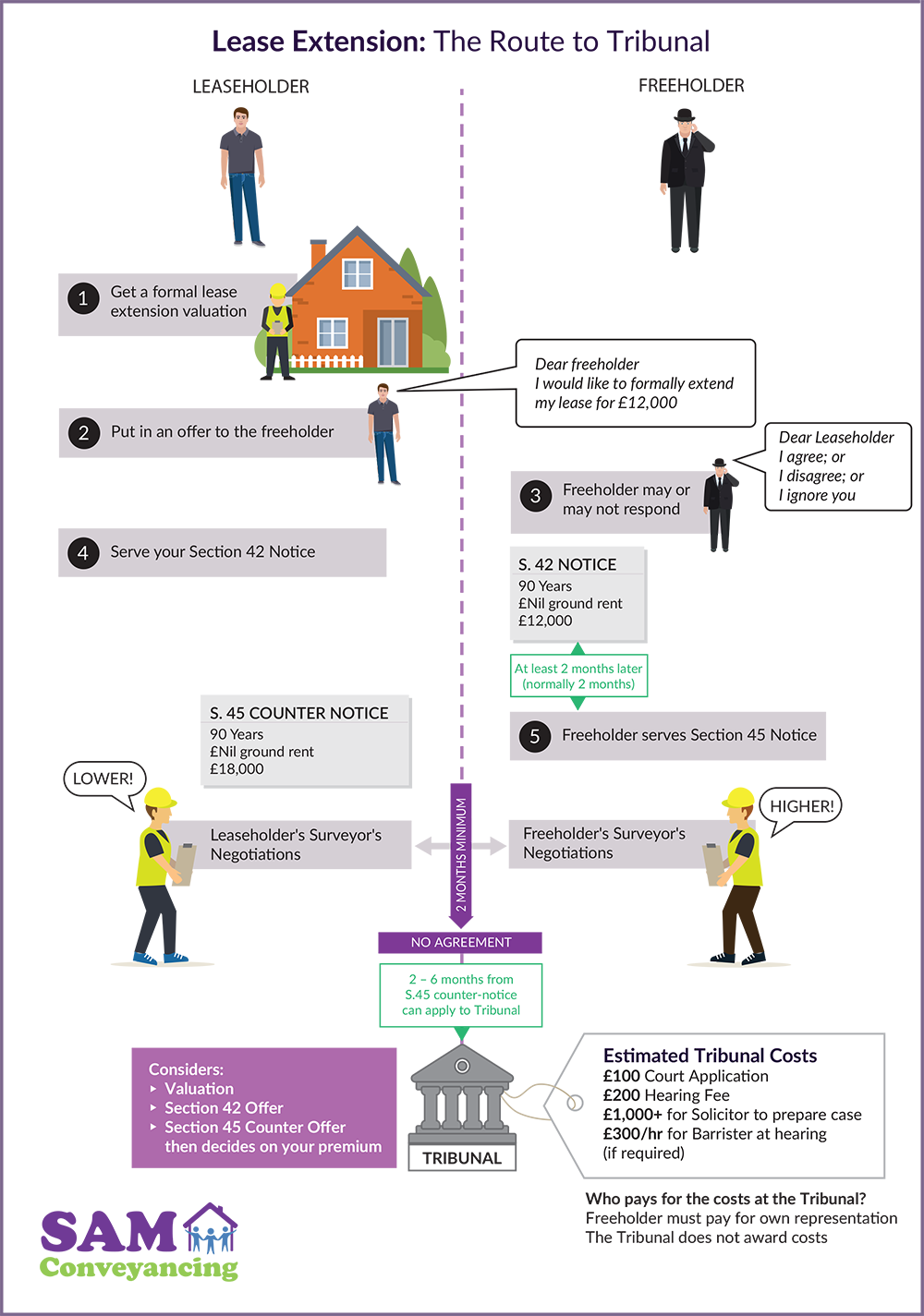First-tier Property Tribunal for Leasehold Disputes
- The First-tier Property Chamber exists to resolve disputes between landlords, tenants, freeholders, leaseholders, park home occupiers or site owners, for a range of cases, including lease extension.
- This article focuses on bringing a claim to a tribunal for a statutory lease extension or enfranchisement. If you have another kind of claim, get in touch to see how we can help.
- Formal lease extensions rarely get as far as application to the tribunal, and it is even less common for a tribunal appointment to actually occur.
- As a leaseholder, applying to the FTT is usually only cost-effective if your freeholder wants a lease extension premium which is £10,000 (or more) higher than you have proposed.
- Your freeholder will normally want to settle before the possibility of being summoned to the FTT arises, because they'll have to pay their own costs. It is extremely unlikely that the tribunal will make an award for costs (where the loser pays the winner's expenses) in a lease extension case.
What is the First-tier Tribunal (FTT)?
The Tribunal is part of the Her Majesty’s Courts and Tribunals Service. There are seven 'chambers' that handle disputes under different areas of law, and we'll focus on the property chambers. The other six chambers are War Pensions and Armed Forces Compensation; Social Entitlement; Health, Education and Social Care; General Regulatory; Tax; and Immigration and Asylum.
The First-tier tribunal Property Chamber is made up of two divisions
Land Registration Division
This covers disputes over changes to the land register and applications to cancel or correct certain documents relating to registered land.
Residential Property Division
This covers fair rent and leasehold disputes and the right to buy your council house being refused.
Each Tribunal usually consists of three members: a lawyer, who is often the chairman, a valuer and a layperson (a normal person). The Tribunal is entirely independent and impartial in its approach. There are five regionally based Tribunal offices (London, Northern, Midland, Eastern and Southern).
Who can bring a claim to the First-tier Tribunal, and when?
You can bring a claim to the First-tier Tribunal, Property Chamber, or Residential Property Division if you are a landlord, tenant, freeholder, leaseholder, park home occupier or site holder.
What cases will the First-tier Property Chamber hear?
You can apply to the Land Registration division if you want to correct or cancel certain documents relating to registered land. There are different application forms to rectify or set aside documents or to object to such an application.
Alternatively, you may be referred to the Land Registration Property Chamber by HM Land Registry, if you're in a dispute over a change to the land register.
For normal changes to the land register which do not involve a dispute, you can apply directly to HM Land Registry, or get in touch to see how we can help you with your Land Registry application.
Cases include:
- Rent increases for 'fair' or 'market rates';
- Leasehold disputes including service charges, management disputes and recognising a tenant's association;
- Leasehold enfranchisement or lease extension;
- Disputes about park homes, such as changes in pitch fees;
- Local authority fines;
- Rent repayment orders;
- Improvement notices and prohibition orders where your notice is under the Housing Act 2004;
- HMO (house of multiple occupation) licensing;
- Refusal of the right to buy your council house, because it is deemed suitable for elderly people;
- Charging of banned landlord fees, ie for a credit check.
How does the First-tier Property Tribunal work?
If a hearing is required, the tribunal will hear the case publically unless they are satisfied that under the circumstances of the case, the hearing should be held in private, subject to the overriding objective that all cases are dealt with fairly and as conciliatorily as possible.
The tribunal will consider the complexity and costs of the case, as well as each party's ability to fully participate in proceedings. They will consider evidence from both sides and may ask questions. Tribunal hearings are less formal than court hearings and the tribunal may simply make a decision based on the evidence that has been provided.
Can I resolve my dispute without going to the tribunal?
As a leaseholder taking the formal route, you'll have served a Section 42 notice to your freeholder. You may have received a counter offer in a Section 45 notice.
If you can't agree on lease extension terms, you should get a proper lease extension valuation if you don't already have one. The valuation report will help you to negotiate with the freeholder.
You may also pay your solicitor to negotiate on your behalf, they will be able to prepare the best argument for your freeholder to reach a compromise and avoid a tribunal.
How do I bring my leasehold claim to the First-tier Tribunal Property Chamber?
If no agreement can be reached, you can take a case to the FTT 2 months after you've received your Section 45 Landlord's Counter Notice, in which your Freeholder has agreed to your right to a lease extension but not your premium/terms.
You must make your application within the next 4 months after the 2-month elapsed period. You are now strongly advised to instruct your solicitor to prepare your case for the tribunal. They will inspect all the documents and evidence of relevance up to that point, including:
- Your RICS Leasehold Valuation (which states a financial range within which the premium should fall)
- Your Section 42 (Tenant's) Notice (which critically includes your premium offered)
- Details of any other related correspondence with your landlord freeholder
They then collate these and include them in the required application they make to the tribunal.
Can't agree on your lease extension premium with the freeholder?
Our expert property lawyers and RICS surveyors can help with your formal lease extension valuation, negotiation and conveyancing, as well as taking a case to the First-tier Property Tribunal if required. We'll always aim for the most prompt and cost-effective resolution for you.
Lease Extension Solicitors – RICS Leasehold Valuers – Experts in First-tier Property Tribunal cases
First-tier tribunal costs
- £110 application fee.
- £220 hearing fee (if this is required).
Your solicitor makes these payments on your behalf and keeps you briefed on the progress of your application. If it goes this far, they'll inform you of what date your hearing is booked for and where the tribunal will be held.
Once an application is made, it is highly likely that you won't actually have (or pay for) a hearing because your freeholder will settle to avoid the costs involved.
Do you have to be represented by a barrister or solicitor?
If the case does go to tribunal, proceedings are semi-formal, so neither you nor your freeholder/landlord has to be represented. However, lease extension is highly technical. We strongly advise that you are represented by a barrister or solicitor, not least because your freeholder is likely to have representation of their own.
When do the First-tier Property Tribunal make a decision?
Most often you will be told at the hearing itself. You and your freeholder will receive written notification of the decision within 6 weeks along with reasons for the decision.
What happens after the Lease Extension Tribunal?
You have 28 days to appeal against the leasehold valuation tribunal determination on your premium, which then becomes final. Appeals must be made to the Lands Tribunal (Upper Chamber) but only with the leave of the tribunal (unless the case involves huge sums of money, which is extremely unlikely for a residential leasehold extension, an appeal would be an extremely rare event).
After the Tribunal decision is final, your landlord must provide their draft lease within 14 days. You and your landlord must enter into the new lease within 2 months of the decision becoming final; if this doesn't happen, you have 2 months to apply to court, to force your landlord to meet their obligations.
What is the final lease extension conveyancing process?
Your solicitor:
Drafts the new lease
Once the premium has been agreed between you and the freeholder, the freeholder's solicitor drafts a new or variation to the existing lease and sends it through to the leaseholder's solicitor. This process can take anywhere between a week to a month so you must chase the freeholder's solicitor.Review the new lease
The leaseholder's solicitor reviews the new/varied lease, including the demise, terms, covenants, and third party's rights, which are correct and in line with what has been agreed.Signs the new/varied lease
The leaseholder's solicitor provides the lease for signing to the leaseholder. This is signed as a deed and requires a witness. Once signed the lease is sent back to the leaseholder's solicitor.Completion
A completion date is set, that normally ties in with a remortgage or sale (if this is how the premium is being funded). On the day of completion, the leaseholder's solicitor sends the premium for the new lease and the freeholder's professional fees to the freeholder's solicitor, and upon receipt of this, they confirm completion.Post completion
After completion, the leaseholder's solicitor pays any stamp duty, settles any ground rent or service charges due and then registers the new lease at the Land Registry.

Andrew started his career in 2000 working within conveyancing solicitor firms and grew hands-on knowledge of a wide variety of conveyancing challenges and solutions. After helping in excess of 50,000 clients in his career, he uses all this experience within his article writing for SAM, mainstream media and his self published book How to Buy a House Without Killing Anyone.
Caragh is an excellent writer and copy editor of books, news articles and editorials. She has written extensively for SAM for a variety of conveyancing, survey, property law and mortgage-related articles.









